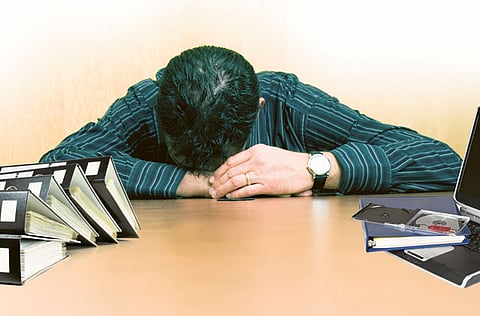Insensitive workplaces causing burnout
Intense environment at work causes stress and demotivation; reduces productivity

Every day, Sandra Morales prays in silence before stepping into her boss's office.
"He's got the habit of shouting at his staff even over trivial matters. Hardly a week goes by that he doesn't go ballistic, so I always pray before I approach his desk," the Filipina expatriate, a personal assistant at a company in Dubai, says.
Such intense environment has pushed Morales to work harder, hoping that the boss would mellow down and recognise her talents.
"I make sure I'd reach the office at 7am and deliver more than what is expected of me. I try to do multiple tasks, to the extent that I don't take breaks anymore. Even trips to the bathroom are sacrificed."
After years of trying, Morales is now at a breaking point.
"I want to quit now. I can't take any more of the nasty treatment. Besides, no matter how hard I try, he doesn't seem to notice it. I haven't had any increase in years."
In one particularly awful case, she recalls, "he threw a pile of papers on the floor while cursing. I had to calm myself down and picked up the documents. I felt I was being humiliated."
Morales admits she's on the brink of a job burnout and that her emotional and physical health is at risk.
"I've gained a lot of weight since I turn to food for comfort. Lately, I've been diagnosed [as] having kidney stones and I get chest pains. The only thing that keeps me going is the money," she says.
Like Morales, many people work under a great deal of stress, which can lead to burnout and ultimately jeopardise work productivity and performance.
Dr Michael Burchell, partner and director of the Great Place to Work Institute in the UAE, describes burnout as "the experience of long-term exhaustion and diminished interest."
He, however, clarifies that burnout is not the same thing as stress.
"Whereas stress is characterised by over-engagement, for example, burnout is characterised by disengagement," he says.
"In companies with great workplaces, we see little evidence of this condition. However, in companies with less positive work places, we actually see a lot of burnout among employees. It is a key reason for reduced productivity and voluntary turnover," he explains.
"The major causes of burnout we see in these organisations include not seeing systems or people change, unrelieved workload, lack of control, thanklessness, team dispirit or lack of social support, unfairness or hypocrisy and values dissonance."
As many companies struggle to meet targets in a difficult economy, more people find themselves working doubly hard and not getting extra compensation, or even credit, in return.
Experts say this is another major cause of burnout.
"The current economic climate means that people in many companies are expected to achieve more with less… Burnout is often created by people feeling like they are taking two steps forward and three steps back, never quite achieving a positive impact or results," notes Hazel Jackson, chief executive officer of biz-group, a corporate training, teambuilding and business strategy company.
"This is often fuelled by companies not providing all the right information at the right time, so individuals have to re-do the work or sometimes spend hours producing a report that never gets read by anyone.
"Bureaucracy can also mean it takes a long time to achieve something simple, adding to frustrations and feelings of burnout," she says.
She says the burnout feeling is also often enhanced by a sense of being out of control: too many tasks to complete and not enough time.
Have your say
Do you work in a stressful office environment? How has that impacted your personal life? Share your stories with us and tell us what you would like changed in your workplace by clicking on the "Post a comment" link below or by emailing us at readers@gulfnews.com
Sign up for the Daily Briefing
Get the latest news and updates straight to your inbox



